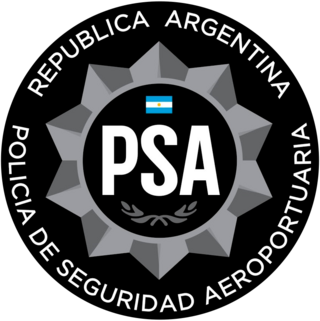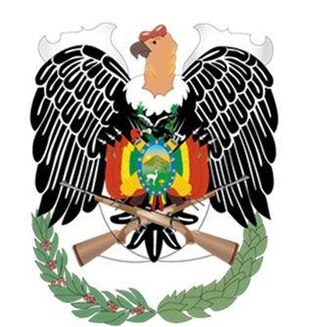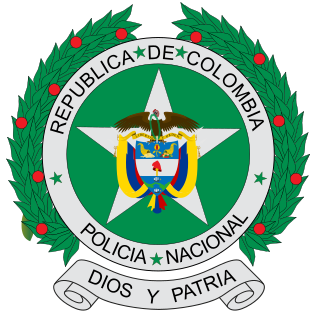Organisation
The National Police of Honduras operates under the legal framework of the "Organic Law of the National Police". Article 293 of the Constitution of Honduras by Decree 136-1995 and Decree 229-1996 in addition to Article 22 of its Organic Law by Decree No. 67-200815 defines the work of the National Police. [18]
The National Police of Honduras is governed by the office of the Director General of the National Police (DGPN). There is oversight by the Office of Security (one of sixteen secretariats of the Executive Branch of the government) headed by the Minister of Security.
In 2010, the Office of Security operated with a budget of Lps. 3,129,454,629 (US$165.143 million). The main division of the force, the "Dirección Nacional de la Policía Preventiva", DNPP (preventive policing unit) had the highest expenditure at about Lps. 1.333.687.852 (US$70.3 million). [19]
The National Police of Honduras has six divisions or "National Directorates". [20] They are:
- "Dirección Nacional de la Policía Preventiva", DNPP (preventive policing unit)
- "Dirección Nacional de Investigación Criminal", DNIC (criminal investigation unit)
- "Dirección Nacional de Servicios Especiales de Investigación", DNSEI (investigative special services unit)
- "Dirección Nacional de Tránsitos", DNT (traffic policing unit)
- "Dirección Nacional de Servicios Especiales Preventivos", DNSEP (preventive special services unit)
- "Sistema de Educación Policial", SEP (police education unit)
The SEP includes four units: the National Police University of Honduras (UNPH), the Police Technological Institute (ITP), the National Police Academy (ANAPO) and the School of Sub-Officers (ESO).
Dirección Nacional de la Policía Preventiva
The DNPP combats crimes related to organized crime, such as smuggling, fraud or tax evasion and implements police controls on taxes. It combats the production, use, possession and illegal trafficking of arms and drugs. It enforces the legal order of transportation, transit and roads, and exercises security functions in immigration matters.
The DNPP is managed by officers with a degree in Police Science. The officers receive an undergraduate degree from the National Police University of Honduras (UPNH), and the rank of Sub-Inspector of Police. The uniforms, patrol cars, Galil pistols and regulation rifles of the officers are colored blue. [21] The division also has "Falcon" Bell 206 JetRanger helicopters at their disposal in an air unit.
Dirección Nacional de Investigación Criminal
The DNIC was developed with training and instructors from Scotland Yard (UK), Federal Bureau of Investigation and Drug Enforcement Administration (US), and Mossad (Israel). This unit utilizes regulation weapons including the 9mm calibre Glock, the Remington shotgun, and the IMI Galil rifle. A Director General and a representative of the Public Ministry of Honduras work together as heads of the DNIC. A forensic physician from the Faculty of Forensic Sciences is associated with the DNIC.
Within the DNIC unit is the DGIC unit (DPI). It drafts eighteen-year-old men and women who have just completed secondary or university education to become detectives. The head of the unit is an officer of the rank of commissioner or an inspector. [22]
Each unit also has agents who are crime scene technicians, crime scene investigators, violent crime scene technicians, analysts, ballistic analysts, specialists in reconstruction, field inspection, computer crime, drug related crime and graphics and drafting. [23]
Special units
Comando de Operaciones Especiales (COECO)
The Comando de Operaciones Especiales COECO ("special operations command" or "Cobras") are an elite unit of Honduran police agents skilled in managing riots and disturbances, sniper shooting, and tactical and special operations. The unit trains with American SWAT units. [24]

Tropa de Inteligencia y Grupos de Respuesta Especial de Seguridad (TIGRES)
On 26 July 2012, legislation was passed for the creation of the TIGRES, "Intelligence Troop and Special Security Response Groups" or "Tigers". The TIGRES counters organized crime and hooliganism, in conjunction with judges and public prosecutors. The TIGERS are trained for several months by instructors from the US Army Special Forces and members of the JUNGLAS unit of the Colombian National Police, with the support of the US government. [25]
Direccion Policial de Investigacion
On 1 September 2015, President Juan Orlando Hernández formally opened a new police investigation unit, the DPI. The DPI works in regional headquarters including San Pedro Sula, La Ceiba, Santa Rosa de Copán, Comayagua and Choluteca.













